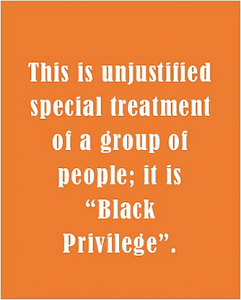More on Black Privilege Being Real in America
22 January 2020
My column two weeks ago was titled “Black Privilege is Real in America”. I shared my reaction to an opinion piece that appeared in the Fayetteville Observer. It was written by Debra Figgins and titled “County schools must address racial disparities in discipline”. The writer presented several actions that she contended should be taken by the Cumberland County School System to reduce adverse disciplinary actions toward black students. I saw her presentation as reflecting “Black Privilege”. (See https://www.karlmerritt.com/2020/01/09/black-privilege-is-real-in-america for my column.) In part, I wrote:
If I have accurately assessed what is being called for here, it means special treatment of disruptive black students, while disadvantaging educators and non-disruptive students. For educators, that disadvantaging comes by way of adding a multitude of new requirements to a workload that is very likely already overwhelming for most. Further, the additional requirements, without attention to parental and student responsibilities are doomed to failure. Sadly, students who, without regard to race, will be disadvantaged in that teachers will have even less time and energy for helping them in their education process.
The bottom line is that this is a call for special treatment of black students, while disadvantaging educators and other students; even those black students who want to learn and do not present disciplinary problems. This is “black privilege”.
The school situation allowed for discussion of one manifestation of Black Privilege. However, another glaring indicator came along at about the same time as I was writing regarding Cumberland County Schools. In a column titled “Smith Recreation Center as Early Voting Site for Primary: Fear and Anger”, I addressed the push to make Smith Recreation Center an early voting site for the 2020 Primary. (See https://www.karlmerritt.com/2019/12/29/smith-recreation-center-as-early-voting-site-for-primary-fear-and-anger.) Because the Cumberland County Board of Elections was not able to unanimously agree on a 2020 Primary early voting plan, the decision had to be made by the North Carolina Board of Elections. With three Democrats and two Republicans on that board, only a majority vote is required. Democrats from our local board presented a Majority Plan and Republicans presented a Minority Plan. This was done before the State Board on 20 December 2019.
The State Board voted, along party lines, to approve the Majority (Democratic) Plan. This was not a surprise to me. However, I found the Majority’s argument weak, while Democrats on the State Board seemed to totally disregard the case made by the Minority. Given that the area in question is predominately black by population, I hold that this is another case of “Black
Privilege”. What follows are some instances reflecting Majority argument weaknesses and/or disregard of the Minority case.

Rev. Dr. Floyd W. Johnson Jr., Democrat and chairman of the County Board, opened the Majority presentation by saying, in part, “The members of the Majority Plan agrees that due to the aging community and lack of personal transportation that the Smith Recreation Center as an early voting site is a necessity because voters will not have to walk or ride the bus to another voting site. The site will not only accommodate the students from Fayetteville State University but also the voters from the Town of Spring Lake.”
He went on to say that the recommendation regarding Smith is not driven by consideration of race. This was followed by Johnson saying, “It is, however, one of the heaviest poverty struck areas in Cumberland County that is centered in heart of Afro-American community. It makes sense that everyone should have a right or access to a voting site regardless of their circumstances.” When this opening is viewed in light of other information that was provided and the summary quote from my column which is repeated at the end of this one, what is being called for here constitutes special treatment of black citizens in the area surrounding Smith.
Linda Devore, Republican and County Board member, talked about the Minority’s approach to selecting early voting sites. She emphasized that they want to minimize wait times on Election Day. That means focusing on large precincts when selecting early voting sites. Some have as many as nearly 5000 registered voters. This is not the case in older neighborhoods like around Smith Recreation Center and around the Board of Elections. For me, this approach seems very reasonable. This thoughtful approach does not support making Smith an early primary voting site.
Irene Grimes, Democrat County Board member, also spoke for the Majority Plan. At one point, she made this statement:
I know we are probably going to hear about budgetary restraints that should keep Smith closed for the primary. Those, of course, have to be taken into consideration. However, one of the biggest arguments for Smith is that, this community, every time we have had a meeting about early voting plans, primary or general election, this community has shown up. They have shown up at the meetings advocating heavily for this center to be open. I believe we all are constantly lamenting the lack of voter participation in our elections. So, one of the biggest arguments is if the population in that area wants Smith Recreation as a voting site, then we should give it to them.
I read this statement to say forget cost, scrap reason, and just give people what they want. That is a troubling approach and a weak argument. It is even more troubling when a statement by Linda Devore, regarding the 12 November 2019 meeting referred to above by Grimes, comes into play. Devore said, “Of the 46 who attended the meeting, only two live in the precinct where Smith Recreation is and only one was from the adjacent precinct. The other people live in scattered precincts all across the county.” These numbers do not line up with the tremendous interest and support argument claimed by Grimes.
Johnson and Grimes talked about not wanting voters to have to walk or take a bus to the Board of Elections to vote early. I found this interesting because of what was said about proposed weekend early voting. Devore explained that the Minority Plan called for Saturday voting on the first and third Saturdays so that workers would not work two weekends back-to-back. Grimes responded by saying:
I have been an election poll worker before I was appointed to the board. I also ran an early voting site and I know that whether you are regular staff member at the Board of Elections or a temporary poll worker like I was, everybody is extremely dedicated. And I understand that we have … that we wanted to take into consideration the staffing issue but it’s an election. I mean, we all just buckle down, put on our big girl pants, and do the 18 hours we have to do.
So, people should not have to take a short bus ride to vote, but workers should “…put on big girl pants and….” This sounds like very special treatment of a selected group of people.
Dr. Stella Anderson, Democratic member of the State Board, questioned Linda Devore regarding a reference Devore made during the 12 November meeting to a newly revised state statute, adopted days earlier. Anderson based her question to Devore on an article from the Fayetteville Observer titled “Vote site fight: Should early voting be held next door to Fayetteville State University?” Devore explained that her comments were mischaracterized by the Observer, which did not have a reporter at the meeting. At the Nov 12 November meeting, Devore read the relevant section of the statute and then raised the concern about how this newly revised statute should be applied to the Smith issue. She also expressed her concern that the plan be based on what is best for the voters of the entire county.
The following section from my column gives attention to what Devore was referring to (“four precincts” are those close to Smith):
Finally, this singular focus will very possibly conflict with the intent, if not the letter, of recently passed legislation. During the 2016 primary, in these four precincts, a total of 2516 ballots were cast: 205 by Republicans, 2301 by Democrats and 10 by others. Having Smith Recreation as an early voting site during the primary would clearly favor Democrats and a primarily black population. Senate Bill 683/SL 2019-239, 163-227.6(b) speaks to voting site selection and ends with “…that the use of the sites chosen will not unfairly favor any party, racial or ethnic group, or candidate.”
My assessment is that Anderson made a lengthy statement intended to exempt the State Board from considering the requirements of Senate Bill 683/SL 2019-239, 163-227.6(b). Quoted below is the heart of her statement:
We all need to be understanding about what the considerations are supposed to be for the State Board when we have before us petition plans. And the standard is for us to look at the plan as a whole…period. All of the sites that are proposed for the county and the extent to which the county’s electorate is well served by, and in this case, the multiple sites that are before us. So it is not the inclusion or exclusion of a single site and the perception of who will be best served, who would be mostly served, by any given site.
Simply put, I strongly contend that Dr. Anderson’s statement dismisses consideration of an applicable statute.
Over the course of this hearing, Linda Devore made several points that were also raised in my column. That was the case because much of what I wrote was prompted by a review of the 12 November meeting minutes. Aside from the statute issue, I summarized as follows:
The picture here is one of misinformation that is not widely and forthrightly corrected by those who initially contribute to forming it: accusations of black voter suppression not supported by facts or reason; focusing on a small segment of the population when, in this case, equal treatment of all should be the aim; disregarding the high financial cost of the proposed change; not recognizing the inequity of having one site so much closer to another than is the case with others; by declining use of city buses, calling for greater convenience than seems necessary.
At the bottom line, Democrats on the State Board approved a plan including Smith Recreation Center, despite a weak argument for doing so, and a multitude of legitimate reasons for not approving it. Even further, they totally dismissed appropriate consideration for a statute that certainly should have been given far more attention. This is unjustified special treatment of a group of people; it is “Black Privilege”.




